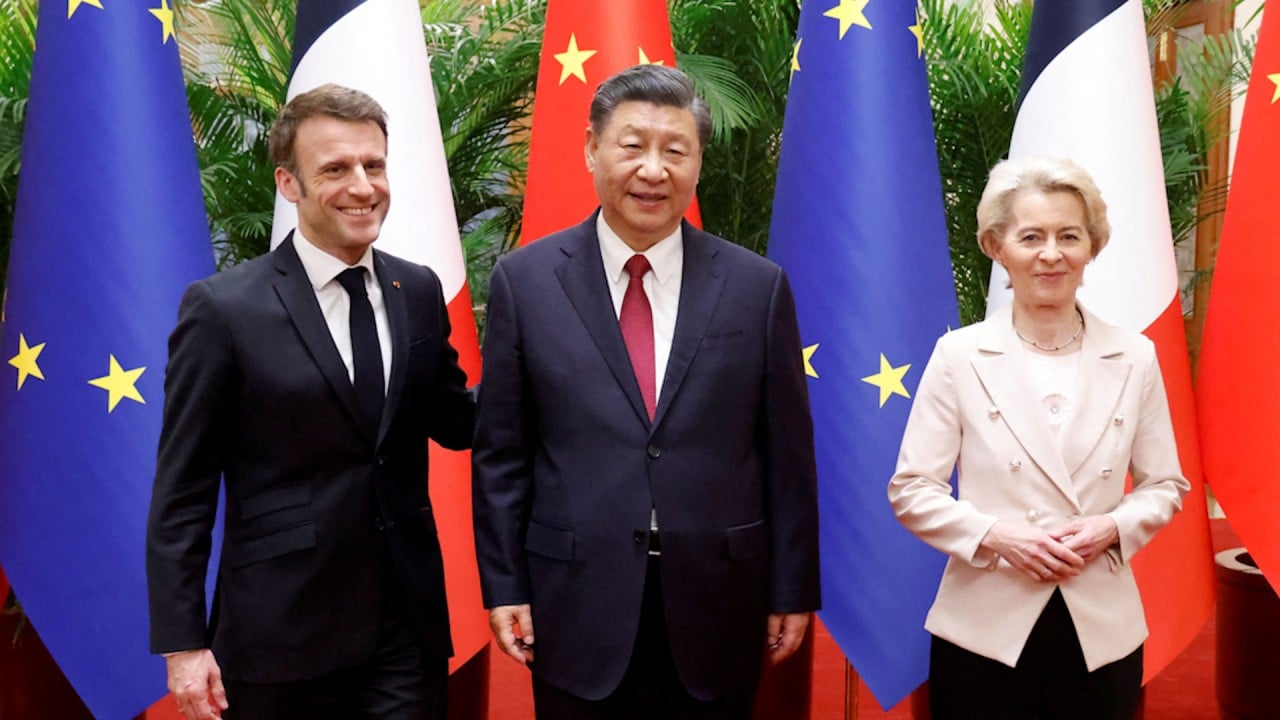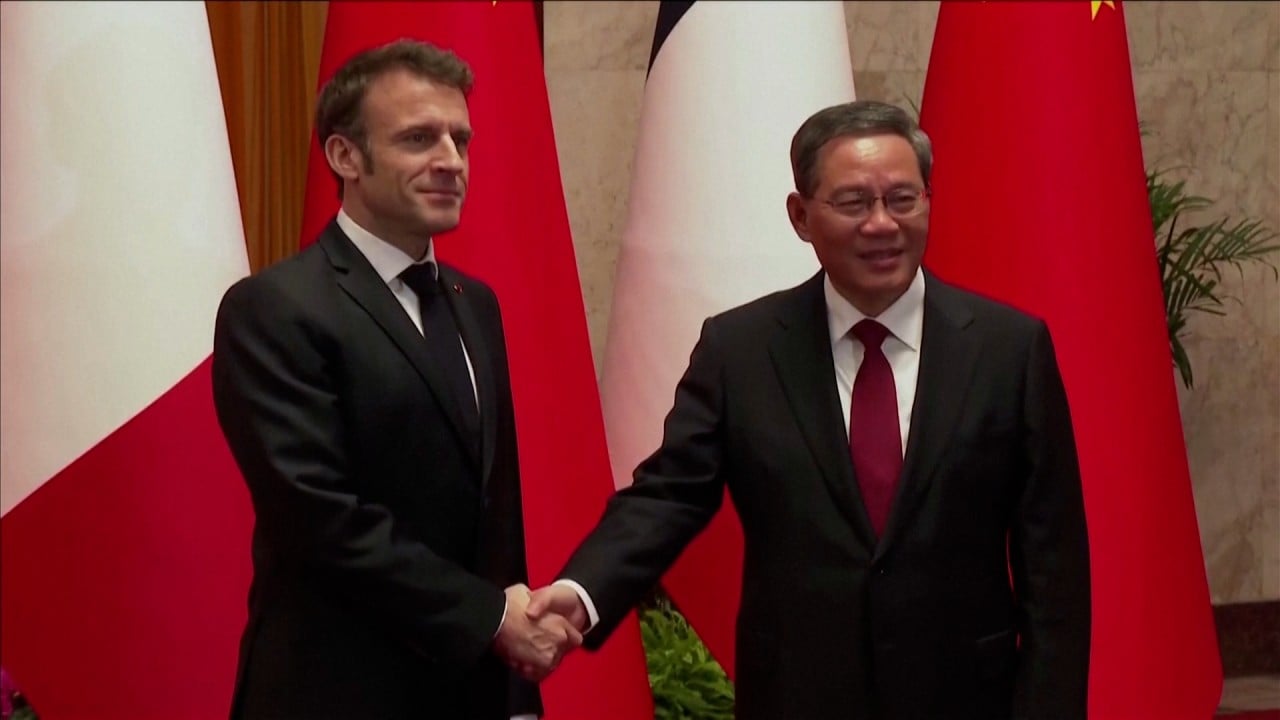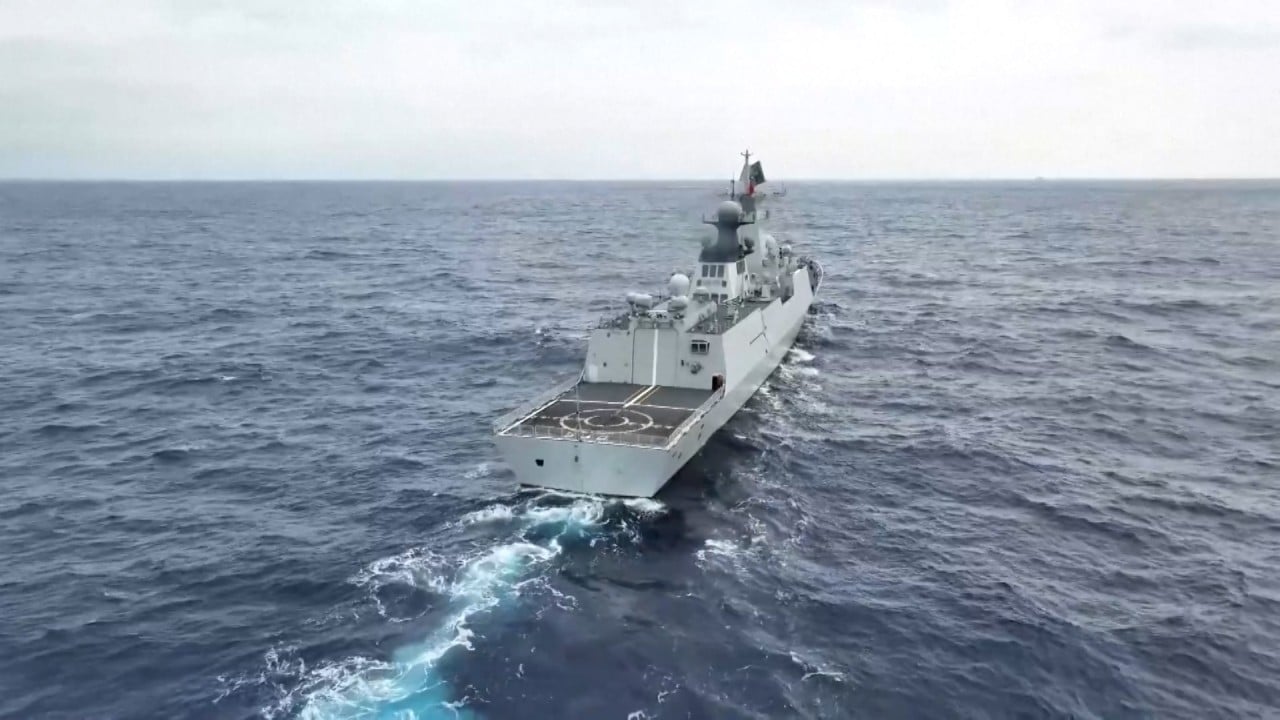
Will Macron’s take on Taiwan tilt the balance in China’s favour?
- The French president’s call for Europe to avoid bloc politics over the island is part of his non-confrontational approach to Beijing
- But observers question whether his comments will remain France’s long-term position
“The worst thing would be to think that we Europeans must be followers and adapt ourselves to the American rhythm and a Chinese overreaction,” Macron was quoted as saying.
“We don’t want to get into a bloc-versus-bloc logic,” he said, adding Europe “should not be caught up in a disordering of the world and crises that aren’t ours”.
The French president’s remarks, including his emphasis on Europe’s “strategic autonomy” and “a European strategy” on China and Ukraine, were in line with his non-confrontational approach in handling China, a direction embraced enthusiastically by Beijing.
During the trip, Macron vaunted the “mutual attraction” and “friendship” between China and France and was given rare, extensive time with Chinese President Xi Jinping.
Observers said his comments laid bare the deep-seated divisions between Washington and Paris on how to handle a rising China.
Shi Yinhong, a professor of international affairs at Beijing’s Renmin University, said it was not surprising that Macron was widely criticised first over his China visit and then for his comments about Taiwan, which some slammed as appeasement to Beijing.
From mainland China’s perspective, Macron’s stance on Taiwan was “very positive” and “flattering”, Shi said, but noted the interview was conducted in the wake of a slew of lucrative business agreements and joint pledges to boost bilateral economic and trade ties.
“It remains to be seen whether they truthfully represent France’s long-term future position on Taiwan, and whether France will oppose in various forms the perceived provocations by the US on Taiwan, such as arms sales,” Shi said.
“It is too early to tell if Macron has indeed made compromises, or [the comments] were just intended to please his Chinese hosts because of a good visit. Don’t be surprised if he back-pedals on those words one day.”
Macron’s discussion with Xi on Taiwan on Friday was in contrast to comments by European Commission President Ursula von der Leyen, who accompanied Macron for part of the China visit.
While the French president raised concerns about “growing tensions in the region”, von der Leyen said “the threat [of] the use of force to change the status quo is unacceptable”.
Shi said it was obvious that Macron and von der Leyen had different roles to play during their joint China visit but it would “be difficult to imagine France and the European Union would take completely opposing positions on sensitive issues such as Taiwan”.
He also said that given the Ukraine war had effectively united the US and its European allies, there was a long way before Europe would emerge as “the third pole” against the US and China, as Macron put it in the interview.
Li Fei, a researcher at Xiamen University’s Taiwan Research Institute, said China would be pleased at Macron’s unusually positive remarks on Taiwan, because for Beijing, the Taiwan issue remained the bedrock of Beijing’s ties with Brussels.
“I think he is trying to return the goodwill and favour he’s received in China,” Li said.
It remains largely impossible for Europe to completely disengage from the United States
He said the comments were also in line with France’s foreign policy tradition of keeping a distance from the US. With an eye on the leadership role in Europe, Macron had long advocated the creation of Europe’s own military in a bid to reduce its political reliance on the US, Li noted.
“France and China do not have clashing geopolitical interests and there is no need for France to help the US play the Taiwan card against China,” he said.
But Macron is walking a tightrope, according to Li. “He has to take into account French and European interests, but it remains largely impossible for Europe to completely disengage from the United States. We’ll have to wait and see what Macron’s France does in the future,” he said.
In any case, Macron’s remarks are likely to have little bearing in Asia.
Yongwook Ryu, an assistant professor at the National University of Singapore’s Lee Kuan Yew School of Public Policy, said countries that did not want to be involved in a potential crisis in the Taiwan Strait – mainly those in Southeast Asia such as Indonesia and Thailand – would “find comfort and support” in Macron’s remarks.
Conversely, countries that were typically more aligned with the United States would not heed the French leader’s comments, he said.
Washington’s allies in the region, from the Philippines to Japan and South Korea, would continue to side with the US in thinking that a conflict in Taiwan would have far-reaching implications beyond the self-ruled island.
“I don’t think Macron’s comment will have much impact on Asian countries … What Macron did and said matters little to them,” said Ryu, who specialises in international affairs in East Asia.
“In my opinion, France’s recent policy towards China is mainly about trade, not security, and is driven by its worsening domestic socio-economic situation.”
In Southeast Asia, countries feared getting involved militarily and would opt to stay out of the potential conflict as much as they could but they would likely be dragged into diplomatic warfare, he added.
Meanwhile, analysts also suggested that Australia – one of Washington’s closest allies in the Asia-Pacific region – would likely stay silent on Macron’s comments.
James Laurenceson, director of the Australia-China Relations Institute at the University of Technology Sydney, said the Albanese administration was less inclined than the previous Morrison government to “adopt a simplistic world view of liberal democracies versus authoritarians”.
Past comments made by Australian Foreign Minister Penny Wong also indicated that there was greater awareness in Canberra than Washington of the importance of deterrence and reassurance in avoiding a catastrophic US-China clash, he added.
“I don’t expect an Australian government rethink following Macron’s remarks, other [than] to reinforce an assessment that if there were a clash over Taiwan, France and perhaps Europe more generally could only be counted on to offer limited support,” Laurenceson said.
“I don’t expect we’ll see an Australian leader use the same formulation that Macron did, but clearly there’s an awareness that deterrence alone is not enough, and that Washington’s rhetoric and actions aren’t always helpful.”





